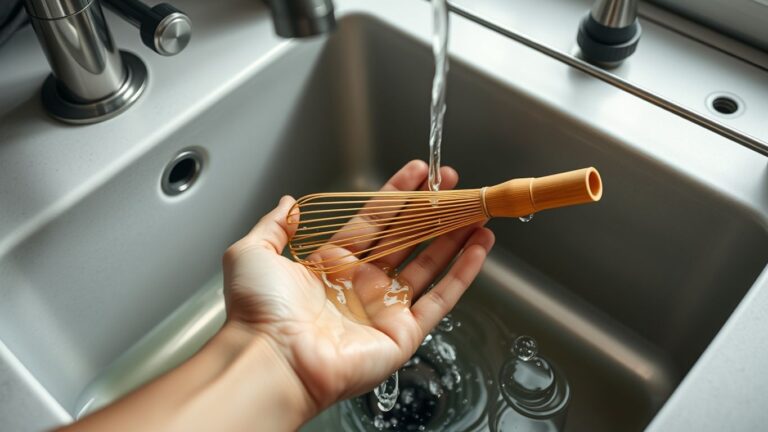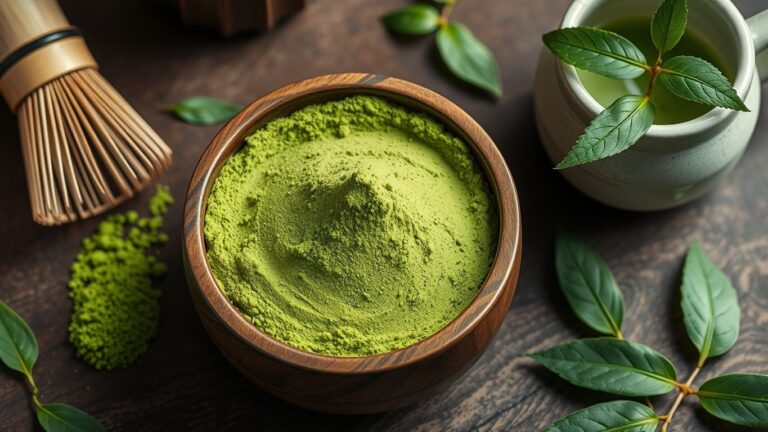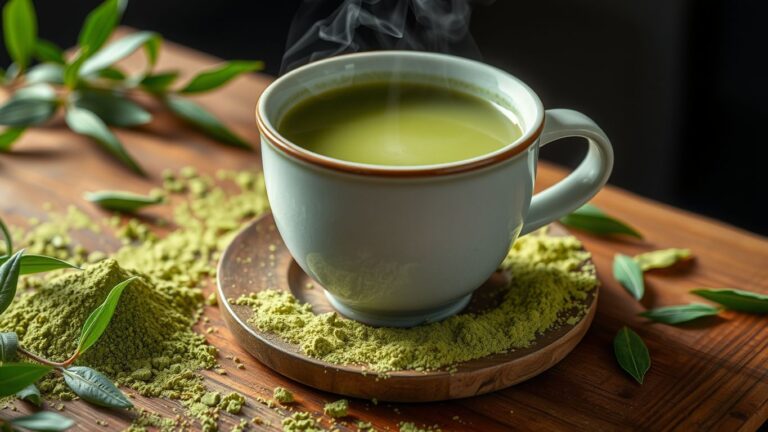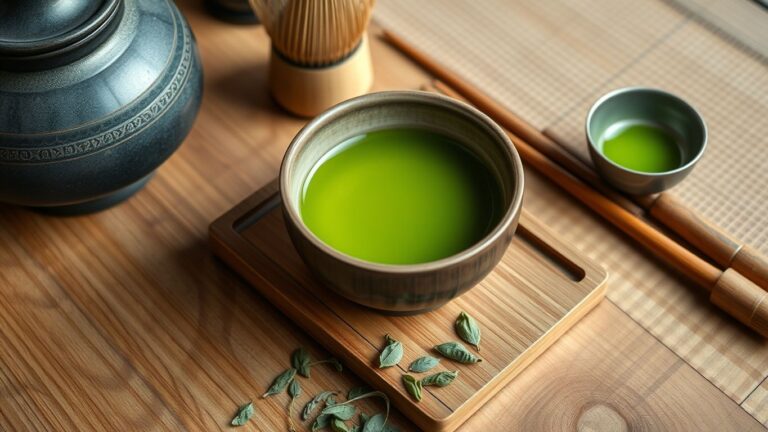Cats are curious creatures, and they often show interest in what their humans are eating or drinking. If you’re a fan of matcha, you might wonder if it’s safe to share this green tea powder with your feline friend. While matcha has many health benefits for humans, it’s important to understand how it might affect cats before offering it to them.
Key Takeaways
- Matcha contains caffeine and theobromine, both of which can be harmful to cats in large amounts.
- Some potential benefits of matcha for cats include antioxidant properties, improved cognitive function, and oral health benefits.
- It’s crucial to consult with a veterinarian before introducing matcha into your cat’s diet to ensure it’s safe for them.
- Start with very small amounts if your vet approves, and watch for any adverse reactions in your cat.
- High-quality matcha is essential to avoid contaminants that could be harmful to your cat.
Can Cats Have Matcha? Understanding the Basics

What is Matcha?
Matcha is a type of green tea that is finely ground into a powder. Unlike regular green tea, where you steep the leaves and then discard them, matcha involves consuming the entire leaf. This makes it a more potent source of nutrients.
Nutritional Profile of Matcha
Matcha is packed with antioxidants, vitamins, and minerals. It is known for its health benefits, including improved mental clarity, enhanced metabolism, and better cardiovascular health. However, these benefits are primarily studied in humans.
Why Cats Might Be Interested in Matcha
Cats are naturally curious creatures. They might be drawn to the unique smell and taste of matcha. Additionally, some cat foods and treats already contain green tea extract, which could make your feline friend more interested in matcha.
Before you let your cat try matcha, it’s crucial to understand both the potential benefits and risks.
Potential Benefits of Matcha for Cats
Antioxidant Properties
Matcha is packed with antioxidants, which can help protect your cat’s cells from damage. These antioxidants may also boost your cat’s immune system, making them less likely to get sick. Antioxidants are crucial for maintaining overall health and can help your cat stay active and playful.
Cognitive Enhancements
L-theanine, an amino acid found in matcha, has a calming effect on cats. It can help reduce anxiety and stress without making your cat drowsy. Studies suggest that matcha can improve cognitive function, memory, and attention in animals. This means your cat could be more alert and mentally sharp.
Oral Health Benefits
Matcha may also help with your cat’s oral health. It can reduce plaque buildup and fight oral bacteria, leading to fresher breath and healthier gums. Some studies even suggest that matcha can help heal mouth sores and reduce the risk of oral diseases.
Risks Associated with Matcha Consumption in Cats
Caffeine Content
One of the main concerns with matcha for cats is its caffeine content. While matcha has less caffeine than coffee, it still contains enough to potentially cause issues. Cats are more sensitive to caffeine, and even small amounts can lead to restlessness, increased heart rate, vomiting, and in severe cases, seizures.
Theobromine Toxicity
Matcha also contains a compound called theobromine, which is found in chocolate and can be toxic to cats. Theobromine toxicity can cause symptoms like tremors, seizures, and even death if consumed in large amounts. It’s crucial to be aware of this risk when considering matcha for your feline friend.
Digestive Sensitivity
Cats have sensitive digestive systems, and introducing new foods like matcha can lead to gastrointestinal issues. Symptoms may include stomach upset, diarrhea, and vomiting. Always monitor your cat closely when introducing any new food or supplement.
Before giving your cat matcha, it’s essential to consult your veterinarian to ensure it’s safe for them. Your vet can provide guidance on appropriate dosages and monitor your cat for any adverse reactions.
Consulting Your Veterinarian Before Giving Matcha to Your Cat
Before introducing matcha into your cat’s diet, it’s crucial to seek guidance from a qualified veterinarian. They can provide tailored advice based on your cat’s health, age, breed, and any underlying conditions. It’s important to consult your veterinarian before giving your cat matcha to ensure it’s safe for them.
How to Safely Introduce Matcha to Your Cat’s Diet
Starting with Small Amounts
When you first give your cat matcha, start with a tiny amount. Cats can have matcha in moderation, but it’s not essential for their nutrition. Begin with just a pinch mixed into their food and see how they react.
Observing for Adverse Reactions
Keep a close eye on your cat after giving them matcha. Watch for any signs of discomfort or unusual behavior. If you notice anything off, stop giving them matcha and consult your vet.
Adjusting Dosage Based on Vet Advice
Always talk to your vet before adding matcha to your cat’s diet. They can help you figure out the right amount and make sure it’s safe for your pet. Follow their advice and adjust the dosage as needed.
Quality Matters: Choosing the Right Matcha for Your Cat

High-Quality vs. Low-Quality Matcha
When it comes to giving matcha to your cat, quality is crucial. High-quality matcha is made from young tea leaves that are carefully processed to retain maximum nutritional value. On the other hand, lower-quality matcha may contain higher levels of pesticides, heavy metals, or unhealthy additives. These harmful substances can be detrimental to your cat’s health, even in small amounts.
Potential Contaminants in Low-Quality Matcha
Low-quality matcha can contain various contaminants that are harmful to your cat. These include:
- Pesticides
- Heavy metals
- Unhealthy additives
Due to their smaller size and different metabolic processes, cats are more susceptible to these contaminants. Always opt for high-quality matcha to ensure your cat’s safety.
Where to Buy Safe Matcha
To ensure you’re getting the best matcha for your cat, purchase from reputable sources. Look for brands that offer lab-tested products and have positive customer reviews. For example, some customers highlight the quality, ease of use, and travel convenience of certain matcha products. This can give you confidence that you’re choosing a safe option for your furry friend.
Always consult your veterinarian before introducing matcha into your cat’s diet. Quality matters, and so does professional guidance.
Alternative Supplements to Consider for Your Cat
Cat-Specific Green Tea Extracts
If you’re looking for a way to give your cat the benefits of green tea without the risks, consider cat-specific green tea extracts. These products are specially formulated to be safe for cats, removing harmful substances like caffeine. Always check the label to ensure it’s designed for feline consumption.
Herbal Supplements for Cats
Herbal supplements can be a great way to support your cat’s health naturally. Products like those from NHV are 100% natural and vet-formulated, offering remedies to support your cat’s health and wellness. These supplements can help with various issues, from anxiety to digestion.
Commercial Cat Foods with Green Tea
Some commercial cat foods now include green tea as an ingredient. These foods are designed to provide the benefits of green tea in a safe and balanced way. Look for brands that use high-quality ingredients and have a good reputation for pet health.
When choosing supplements, always consult your veterinarian to ensure they are safe and appropriate for your cat’s specific needs.
Signs of Adverse Reactions to Matcha in Cats

Behavioral Changes
When introducing matcha to your cat, keep an eye out for any unusual behavior. Restlessness or hyperactivity can be a sign that your cat is not reacting well to matcha. Other behavioral changes might include increased anxiety or nervousness.
Physical Symptoms
Physical symptoms are another important indicator. Look for vomiting, diarrhea, or any signs of digestive discomfort. Additionally, an elevated heart rate or open-mouth breathing can be serious signs of adverse reactions.
When to Seek Veterinary Care
If you notice any of these symptoms, it’s crucial to consult your veterinarian immediately. Early intervention can prevent more severe health issues. Always monitor your cat closely after introducing any new food or supplement, including matcha.
Real-Life Stories: Cats and Matcha

Success Stories
Many cat owners have shared their experiences with matcha and their feline friends. One user, UncleIroh, mentioned that his aged black cat insisted on drinking the discarded, mildly matcha-flavored water in his kensui. Despite the cat’s age and general disinterest in most things, it seemed to enjoy the matcha water, almost like it was matcha cut with catnip.
Cautionary Tales
Not all stories have happy endings. A user named delightful_cat shared a story about a cat at a cat cafe that ate a few bites of a matcha-flavored cake. The cat seemed fine initially, but the staff was alerted to monitor for any adverse reactions. Matcha is high in caffeine, which can be dangerous for cats, so it’s crucial to be cautious.
Expert Opinions
Experts generally advise against giving matcha to cats due to its caffeine content. While some cats might show interest in matcha, the potential risks often outweigh the benefits. Always consult your veterinarian before introducing any new food or supplement to your pet’s diet.
Scientific Research on Matcha and Pets
Current Studies
When it comes to matcha and pets, scientific research is limited. While there are some preliminary studies and anecdotal evidence, extensive research is still lacking. Most of the current studies focus on the general health benefits of matcha, such as its high levels of antioxidants and polyphenols, which may help protect cells against damage. However, these studies are primarily conducted on humans, and more research is needed to understand the effects on pets.
Gaps in Research
There are significant gaps in the research regarding matcha’s impact on pets. For instance, the specific effects of matcha’s caffeine content and theobromine toxicity on different types of pets are not well-documented. Additionally, the long-term effects of matcha consumption in pets remain unknown. This lack of comprehensive studies makes it challenging for pet owners to make informed decisions.
Future Directions
Future research should aim to fill these gaps by focusing on the safety and efficacy of matcha for pets. Studies should explore the appropriate dosages, potential benefits, and risks associated with matcha consumption in various pet species. By doing so, we can provide more reliable guidance for pet owners considering matcha as a supplement for their furry friends.
Until more research is conducted, it’s crucial to consult with a veterinarian before introducing matcha into your pet’s diet. Their professional advice can help ensure the safety and well-being of your pet.
Conclusion
In the end, while matcha might offer some health perks for cats, it’s not without its risks. The caffeine and theobromine in matcha can be harmful to your furry friend. Always talk to your vet before adding anything new to your cat’s diet. If your vet gives the green light, make sure to use high-quality matcha and give it in small amounts. Keep an eye on your cat for any bad reactions. Your cat’s health and happiness should always come first. So, when in doubt, it’s best to stick with treats and foods made just for cats.
Frequently Asked Questions
Can I give matcha to my cat?
You can give matcha to your cat, but always check with your vet first. They can tell you if matcha is safe for your cat based on its health, age, and breed.
What are the benefits of matcha for cats?
Matcha has antioxidants and nutrients that might help your cat’s immune system and overall health. Some people think it can also help with anxiety and stress.
Are there any risks if my cat eats matcha?
Yes, matcha has caffeine, which can be harmful to cats. It can cause restlessness, a fast heartbeat, vomiting, or even seizures. Always be careful and ask your vet first.
How much matcha is safe for my cat?
The safe amount of matcha for cats depends on their size, health, and how sensitive they are. Always follow your vet’s advice on how much and how often to give matcha.
Can matcha help calm my anxious cat?
Some people think the L-theanine in matcha can help calm anxious cats, but there’s not a lot of scientific proof. Always talk to your vet before trying it.
How should I start giving matcha to my cat?
If your vet says it’s okay, start with a small amount of matcha. Watch your cat for any bad reactions and stop if you see any. Always go slow and be careful.
Are there other supplements that are safer for cats?
Yes, there are many cat-specific supplements made to meet their needs. Talk to your vet to find the best one for your cat.
What should I do if my cat has a bad reaction to matcha?
If your cat shows any signs of discomfort or unusual behavior after eating matcha, stop giving it right away and call your vet. Quick action is important.






